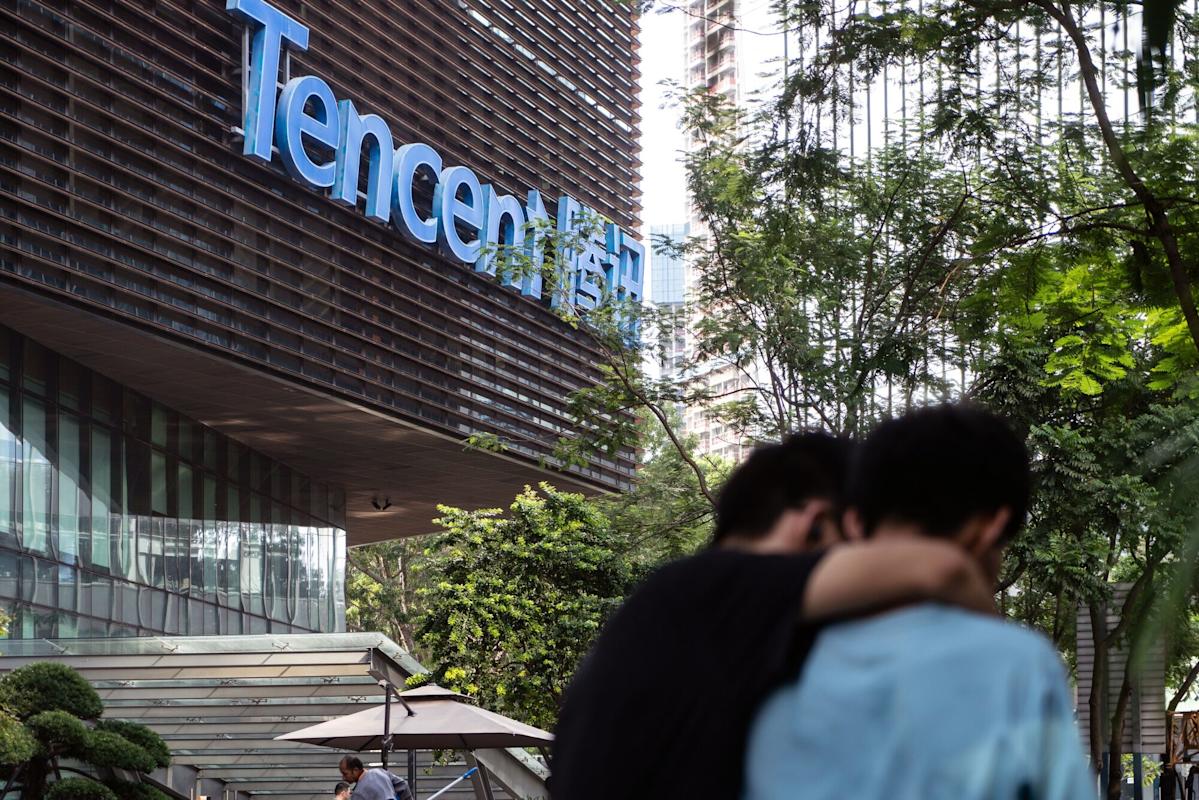Signage for Tencent Holdings Ltd. at the company’s headquarters building in Shenzhen. Photographer: Qilai Shen/Bloomberg
(Bloomberg) — Tencent Holdings Ltd. posted a faster-than-anticipated 15% rise in revenue, sustaining the steady growth that’s helped the social media leader attract investors despite eschewing splashy investments in AI infrastructure.
China’s most valuable company reported sales of 192.9 billion yuan ($27.2 billion) for the three months ended September, propelled by a better-than-estimated 43% surge in international gaming revenue. Net income jumped about 19%. Shares in major shareholder Prosus NV gained more than 2% in Europe.
Most Read from Bloomberg
The results underscore how Tencent can afford to take a more measured approach to AI development than many of its more aggressive rivals. Unlike Alibaba Group Holding Ltd. and ByteDance Ltd., which have plowed billions into AI infrastructure and product roll-outs, the Shenzhen company is focusing more on integrating the technology into its core money-making services including the social media platform WeChat and game publishing. On Thursday, the company repeated those tenets in its statement.
That approach – also in contrast to Silicon Valley giants from Meta Platforms Inc. to Microsoft Corp. – is underpinned by high-margin online content. Tencent’s homegrown developers scored last year with shooter hit with 30 million daily players and now the fulcrum of a global push. Years of investments in major Western studios also bore fruit with popular PC releases this summer like the zombie-slaying title
Tencent will focus in particular on the Hunyuan foundation model that it hopes to integrate more closely with WeChat — known as Weixin in China — the social media, entertainment and gaming platform that underpins its entire business. The company, echoing the ambitions of many tech companies including Alibaba, aims to evolve WeChat into a full-fledged agentic AI-capable service, or a sort of digital assistant for users.
Tencent intends to hire to bulk up its research team, while investing in model architecture. In September, it recruited a prominent language-agent researcher from OpenAI, sparking speculation about his compensation. Executives have said previously the company won’t splurge on hiring or marketing on unproven ventures.
“The blue-sky scenario is that eventually Weixin, with an AI agent, can help a user do a lot of tasks,” President Martin Lau said. “At this time, this is at a very early stage of development.”
Story Continues
Tencent is one of the few major Chinese tech companies to report significant quarterly earnings growth, at a time rivals including Alibaba, JD.com Inc. and Meituan are waging a price war in online commerce. The company’s market value has surged $280 billion this year, yet trades still at a discount to global peers.
Investors have recently begun to reward Tencent’s approach. The stock is up around 4% this month, while Alibaba and JD have fallen in Hong Kong. Bears have retreated on Tencent since earlier this year, with short interest at less than 0.1% of its free float, S&P Global data show.
Alibaba this year managed bigger market gains by grabbing headlines on the AI front. Tencent has been making progress not just with Hunyuan. It’s utilizing generative AI technology in game creation and other areas of its business empire, while embedding AI features in long-running titles including .
Executives however cautioned that chip shortages — a function of restrictions on the shipment of Nvidia Corp.’s accelerators to China — may impede the growth of its cloud business, which rents out computing to developers.
“When AI chips are in short supply, we prioritize internal use instead of renting it out externally,” Lau said. “If there weren’t an AI chip supply constraint, our cloud revenue would be growing more quickly.”
For now, WeChat remains the crown jewel of Tencent’s sprawling online business as it expands its footprint in areas like mini-games, live shopping and advertising.
Lau said Tencent may soon disclose an agreement with Apple Inc. after more than a year of negotiations about the cut the iPhone maker takes on mini-game spending.
Tencent struck a deal with Apple that will see the US company handle payments and take a 15% cut of purchases in WeChat mini games and apps, people familiar with the matter said.
What Bloomberg Intelligence Says
Tencent’s solid, though in-line 3Q results, provide reassurance that it is on track to meet full-year consensus forecasts, despite the backdrop of tariff uncertainty. Overseas video games were the stand-out division, though a margin miss in Fintech — likely driven by Cloud Computing — offset the higher contribution from games. AI-targeting boosted ad sales growth to nearly 21%, which is remarkable for a firm of this size. The 7% EPS beat was driven by a one-off tax benefit.
– Robert Lea and Jasmine Lyu, analysts
Click here for the research.
–With assistance from Luz Ding, Henry Ren, Debby Wu, Ville Heiskanen, Mark Anderson, Jake Rudnitsky and Jeanny Yu.
(Updates with executive’s comments from the fifth paragraph. A previous version corrected a day of the week.)
Most Read from Bloomberg Businessweek
©2025 Bloomberg L.P.

